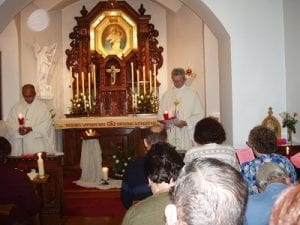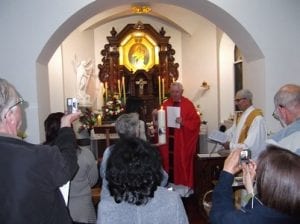


Schoenstatt's Spirituality
Schoenstatt is an international movement within the Catholic Church. Schoenstatt’s spirituality lives by developing and applying a practical belief in Divine Providence for day to day living.
It understands the spiritual life as an imitation of Mary’s life in a Marian attitude and binding to Christ.
The spirituality of Schoenstatt has been experienced in the Movement’s history and described by the Founder Fr Joseph Kentenich as having three dimensions:
• Marian Covenant Spirituality
• Instrumentality
• Everyday Sanctity
Marian Covenant Spirituality
Christianity is a covenant based religion. It is based on the understanding that God entered into a sacred contract or covenant with the people of Israel. He chose us to be His people and He is our God. In Christianity this covenant reached a climax in Jesus who as God and Man gave the perfect response to this Covenant. Within in the Church we enter into the New Covenant with Christ through our baptism.
The Covenant of Love with Mary plays a central part in Schoenstatt’s spirituality. Like the Great prophets of old Mary was the spokesperson or covenant partner for the New Covenant. She is the prototype Christian. Our response to Christ is ultimately based on Her openess to God’s message because through her Fiat or yes to Gabriel’s message, Christ came into the world.
The covenant of Love developed in the early years of Schoenstatt when the Founder Fr Joseph Kentenich (1885 – 1968) was spiritual director to a junior seminary. He invited the boys in his care to Love Mary as Christ did. He urged them to help Mary carry out her great task of bringing the world home to Christ and God the Father by entering into a Covenant with Mary. They were to invite her to make their Chapel (The Schoenstatt Shrine) a place of grace where she could distribute gifts of grace. To show they were serious in their intentions they would start a programme of personal spiritual improvement through prayer and sacrifice.
The proof that Mary responded to this invitation has unfolded over the years and in the History of Schoenstatt’s growth and development.
Instrumentality
The covenant of Love in Schoenstatt is not only about personal formation, it is also about offering oneself up to God to help build up His kingdom on earth.
In reality it is very simple. Through the Covenant of Love we wish and desire to be an instrument of God in the World. In this sense the Covenant is apostolic. Through this we actively build up the Kingdom by seeking to be of service to family, friends, Church and the world in which we live.
At the heart of being an Instrument is the need to be constantly attuned to God’s Will. Here being an instrument meets up with a practical belief in Divine Providence. An awareness of Divine providence is the realisation that God is active and speaks to us in our lives not just at special or extraordinary moments, but day by day and moment by moment.
In this there is the need to constantly renew our efforts to seek and do God’s will and over come the tendency to only do what we want. To achieve this Fr Kentenich often highlighted to need to develop an attitude of childlikeness before God. The person who is childlike is more likely to trust in God and be an effective instrument.
Everyday Sanctity
Fr Kentenich saw a major problem for Christianity today was the way we have distanced our day to day living from our faith. It is as if both are in separate compartments. We might believe but we do not allow it to have any bearing on our lives at home, work or at play. One of the main tasks of the Christian in the modern world is to reintegrate faith and life.
Everyday sanctity can be described as doing ordinary work in an extraordinary way or “Fulfilling the duties of your state in life as perfectly as possible and out of love for God”. It is about trying to find that balance in life where we do not neglect God because of fear of what others might say and not concentrating so much on our religious life that family, friends and associates are pushed into the background.
